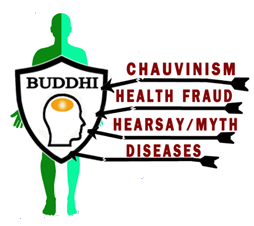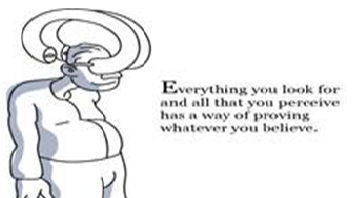Understanding What Is Correct Information - continued

Page Links
Source of any information either for the scientists, experts or for ordinary people, is only the one which comes from the repeated Research Studies on the subject. And if such repeated enquiries, research investigation made either by ordinary persons or scientist, groups of scientists or experts, which has further been critically reviewed by the experts and scientific community (which is called PEER REVIEW) around the world and if the findings of such studies are validated and accepted by the trusted organization, journals and academia (For an example a scientist who did honest research and discovered that there is oxygen gas in the earth’s atmosphere. This information was investigated and validated and accepted by the world scientific community, academia. Now every one of us can believe that there is oxygen in the air) and thus finally this may be the correct source of information for everybody.
Even then keeping our mind open and remaining inquisitive, skeptical is Buddhi because even a well-done honest research findings are not always immune to fallacies, and because knowledge does not end, it always begins.
Some other reasons to remain alert and skeptical about the quality of research studies are the followings,
- Confirmation bias (or confirmatory bias). Which is a tendency to search for or interpret information in a way that confirms one’s preconceptions. Confirmation bias is a type of cognitive bias represents an error of inductive inference toward confirmation of the hypothesis under study. Confirmation bias is a phenomenon wherein decision makers have been shown to actively seek out and assign more weight to evidence that confirms their hypothesis, and ignore or disregard evidence that confutes their favorite personalized hypothesis. As such, it can be thought of as a form of selection bias in collecting evidence streamlined to suit and legitimize one’s personal beliefs.
- Information derived from honest and good research studies on one population may not apply to another. Genetics, sex, environment, age, nationality, race, and many other factors may have diverse effects on the disease under study. Diet and blood cholesterol levels may have very different impacts upon smokers and diabetics than others.
- Peer-Review Fraud — Hacking the Scientific Publication Process is another reason to remain alert and skeptical on findings in research studies even if it has been published in peer reviewed Jounals. Details see at, Article: Peer-Review Fraud — Hacking the Scientific Publication Process NEJM ..The New England Journal of Medicine
- Rarely but at times it is possible that the interest of lead authors of research study are malignant. Among such several, two examples are as mentioned below.

Confirmation bias
- One such example is the South Korean stem cell researcher Hwang Woo-suk, who was convicted on 26 October 2009, for fraud, misusing state funds and violating bioethics laws. Hwang's team in 2004 claimed to have cloned human embryonic stem cells. But the scientist fabricated crucial data, and even other researchers working on the project didn't know the results had been faked.
- Another example of scientific misconduct is Late Dipak K. Das a famous researcher who did myriads of
research publications in support of *RESVERATROL.. purported health benefit in red wine.
Dipak K. Das was a professor of surgery and the director of the Cardiovascular Research Center at the University of Connecticut Health Center in Farmington.
On January 11, 2012 the University of Connecticut Health Center announced that a review board has found Dipak K. Das guilty of 145 counts of fabrication or falsification of data. The U.S. Office of Research Integrity launched an independent investigation of his work.
In May 2012, Das was fired from both positions at the University of Connecticut Health Center.
While above two are examples of some high profile researchers who deliberately commit wrong, however, some time well-done research studies can go bad due to poor study design, bad math or self-serving data analysis, including human errors. Rarely but then well-done and above-board, do health and medical studies have a history of being faulty. - Similarly some poor quality of research studies and also those studies which may be more helpful to
the industries in selling products, can be accepted and published in some highly respected peer review Journals. Possibly this
may happen when all the civilized, alert and committed Custodian of health news providers have at times gone awry, then fortunately
we may have Wilde around the world (Dr.Henry Wilde, MD Physician, editor of Asian Biomedical journal
Chulalongkorn University, Bangkok, Thailand) to help us understand the shortcomings of the research studies, to rescue the
image of the journal and to assist the board of the editors of the journal in becoming more watchful in publishing health
news if its purpose is the public health benefit, not to support industries in selling diseases and cures.
Remark of Dr. Wilde can be seen in the below cited article:
- An article published in Journal Watch,(New England Journal of Medicine) and the comment given by
Dr.Henry wilde, MD on the article is as below;
17 Jan 2014 2:03 PM
As an editor of an Asian Biomedical journal, which strives to achieve international scientific standards, we receive numerous manuscripts presenting favorable data from locally grown herbals for diabetes, ASHD, renal failure and other maladies. Most of these studies are uncontrolled and active ingredients of the herbals are not identified. We made a ruling not to accept such papers unless the pharmacology has been illuminated and the possibly active ingredients have been identified. Here you may have a study that might be a step further ahead but you still have 10, probably not known, herbals with even more unknown potentially active ingredients. This seems to me to call for steps, cumbersome as that would be, to identify ingredients next before publishing it to the delight of the company that markets it. We all know too well that it takes a very long time to discover hidden adverse side effects.
These issues need some discussions as such papers seem to appear increasingly.
Details can be seen at: Chinese Herbals Delay Progression to Type 2 Diabetes
- An article 'Mushroom Extract May Help Treat Obesity', published in Nature
Communications is another example of the trend of respected peer review journal becoming and behaving like an ordinary News
publishing media.
Dr. Monica Aggarwal, a cardiologist and diet expert at Mercy Medical Center in Baltimore, USA has shown her reaction and comments on this kind of research studies which are made to find magic cure to enable industries sell diseases and cures to the people.
Read more at:
A. http://www.livescience.com/51319-lingzhi-mushroom-extract-treat-obesity.html
B. Facts on herbs and Supplements
Many a times faults in the research studies are detected years after its publication on the respected medical journals. Nearly three-quarters of the retracted drug studies were attributed to scientific misconduct, “which includes data falsification or fabrication, questionable veracity, unethical author conduct, or plagiarism. While these studies comprise a small percentage of the overall literature, health care professionals may rely on this evidence to make treatment recommendations.
"These studies can affect the treatment of thousands of patients, since scientific publications are often printed months in advance. There is an average lag in time of 39 months between the original publication and a retraction notice", said, researchers at the University of Illinois at Chicago's Center for Pharmacoeconomic Research to investigate the extent and reasons for retractions in the research.
See our article: 'Bad Science', at United Global Human.org:
Click here to go to UGH website
Opens in new page
Conclusion:
Lesson to learn is that if we wish to remain correctly informed then we must not believe in hearsay and we should not be swayed by the popularity of a person. Nor should we be unduly influenced by powerful propaganda, or the forceful marketing system which involves doctors, experts, researchers, religious and other influential persons, and celebrities. We must also carefully consider information we get from TV, the internet, books and newspapers as these are being widely used as handy tools by vested interests / Marketing to promote pseudoscience for selling unnecessary products, for selling diseases and for selling cures.
Understanding how science progresses and how it is reported can help make sense of health news. Most facts are established through properly conducted and evidenced experiment. Well designed, randomized, placebo-controlled, double-blind trials provide the best evidence.
We will need to keep in mind that the terms "evidence-based medicine" or "Science-evidence based knowledge" are also misused and abused by some so-called 'eminenent experts' and conflicted stakeholders who want to support their views and their products.
Detection of the Health fraud and misconduct in the research studies as in either of the examples of Dipak K. Das "Resveratrol 'Red wine' episode" or the recent R K Chandra 'Multivitamin' episode, are just a tip of the iceberg of health fraud scam which is a befitting paradigm of our present Death Marketing and Death Management civilization. *Resveratrol
Detection of Fraud in research studies "Science", followed by Retraction is essential as it is in diagnosing and in providing cures of diabetes, cancer, heart and other diseases but the underlying causes of either of the ailments in human body or the evils and illness that eclipse Science should be main focus of attention of united global human
Curious may watch on video Not all scientific studies are created equal - David H. Schwartz
Next we hear about the results of a new medical research study specially on health and nutrition, let us investigate the followings;
- What the purpose of the study is.
- Who is going to be benefited by this research studies outcome... the public or the vested interests?
- Was the study in animals or people?
- Does the study include people like us?
- How big was the study?
- Was it a randomized controlled clinical trial?
- Where was the research done?
- If a new treatment was being tested, were there side effects?
- Who paid for the research studies?
- Who is reporting the results?
- Whether the result of research has been accepted and published in the respected peer review journals.
May Read this article:
"The Costs and Underappreciated Consequences of Research
Misconduct": A Case Study. PLoS Medicine, 2010; 7 (8): e1000318 DOI:
10.1371/journal.pmed.1000318
For further knowledge on health fraud and scam, we suggest below listed two websites.
- www.senseaboutscience.org/
A UK-based charitable trust to encourage an evidence-based approach to scientific and technological developments. - www.quackwatch.com/ (Now called Center for Inquiry)
Nonprofit corporation whose purpose is to combat health-related frauds, myths, fads, and fallacies by providing information on quackery and questionable therapies.
Curious readers may like to visit the following improtant websites
- For Consumers, Protect Yourself Against Health Fraud U.S. Food and Drug Administration
- Article: Protect Yourself Against Health Fraud U.S. Food and Drug Administration
- Understanding Medical Research - U.S. National Library of Medicine
- Scienceyness, inflated expectations and damaged research, when will this madness end - Science Policy
- http://sfsbm.org/ - The Society for Science-Based Medicine
-
RetractionWatch.com
*Resveratrol is a polyphenolic compound (plant produce thousands of chemicals which are also called phytochemical to protect themselves from pollution, bacteria and other disease causing agents and from predators. Phytochemicals are present in virtually all of the edible parts of plants.mushroom like fruits, vegetables, legumes (beans and peas), grains, seeds, bark and spices .Eating them in its natural form will help reap health benefit. Our Buddhi our reasoning ability can also point the fact that human evolved to eat natural food as much in its natural form. This is what the latest peer review research evidence are clearly suggesting to stay away from supplements and processed food.

